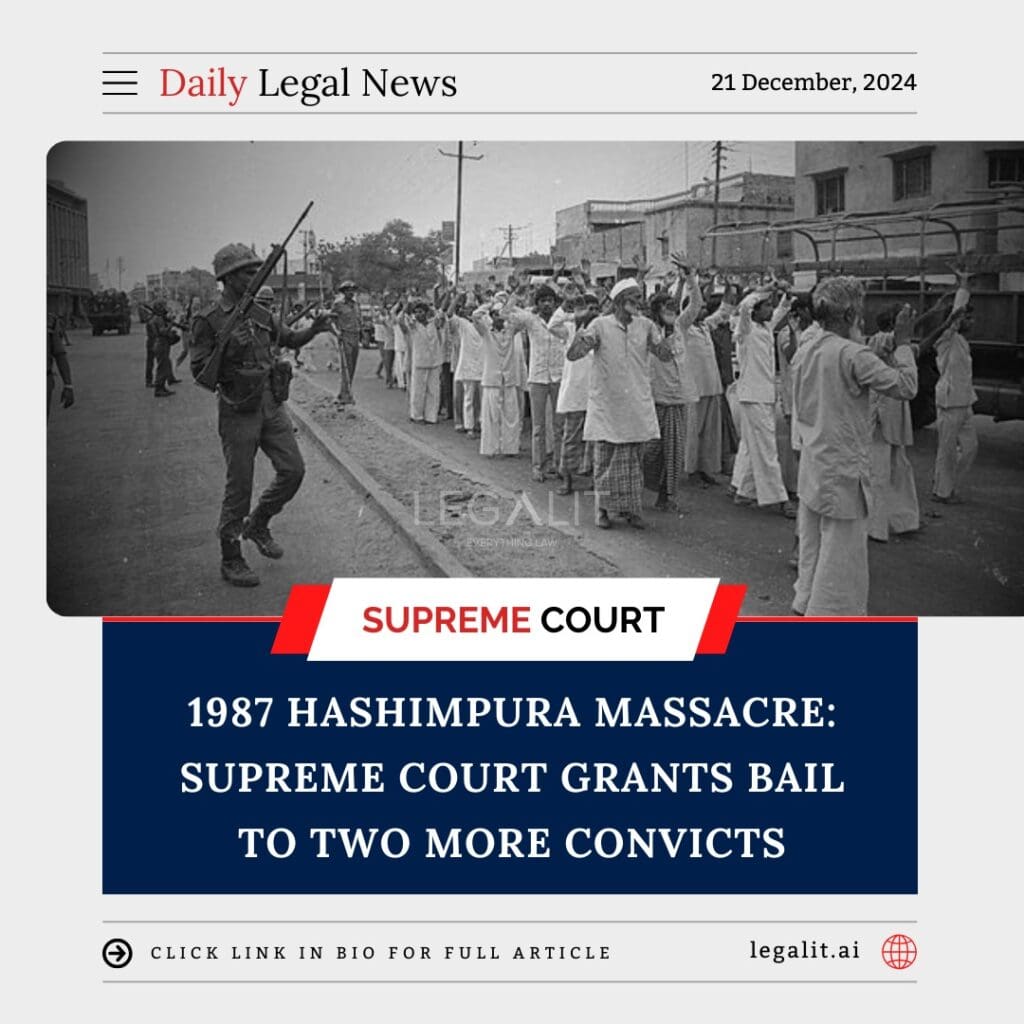
In a significant development in the long-running Hashimpura massacre case, the Supreme Court has granted bail to two more individuals convicted for their involvement in the 1987 incident. The massacre, which took place in Hashimpura, a locality in Meerut, Uttar Pradesh, involved the killing of 42 Muslim men by a group of Provincial Armed Constabulary (PAC) personnel. This latest ruling is part of a broader legal battle that has seen various twists over the years, with many questioning the delays in justice and the implications of the ruling.
Background
The Hashimpura massacre is one of the most tragic and controversial events in the post-independence history of India. On May 22, 1987, a group of PAC personnel allegedly rounded up 42 Muslim men from the Hashimpura locality, forced them into a truck, and shot them dead, dumping their bodies in a canal. The massacre is widely regarded as an example of communal violence, with accusations of police complicity. The case remained in the courts for decades, with families of the victims fighting for justice.
After years of legal battles, in 2018, a trial court convicted 16 PAC personnel for their roles in the massacre. However, the decision was met with mixed reactions, with some celebrating the long-awaited conviction, while others expressed concern over the slow pace of justice. The recent decision by the Supreme Court to grant bail to two of the convicted individuals has revived discussions about the case and the complexities of the legal process.
Key Arguments
Bail Granted Despite Convictions
- Supreme Court’s Discretion: The Supreme Court’s decision to grant bail to the two convicted individuals has drawn significant attention. While the bail was granted after considering various factors, including the passage of time and the length of sentence served, it has raised questions about the legal reasoning behind granting bail in such a high-profile case involving mass murder. The decision appears to be based on judicial discretion, but it has sparked debate on the balance between justice for the victims and legal provisions regarding bail.
- Opposition from Victim Families: Family members of the victims and human rights activists have expressed disappointment over the Supreme Court’s decision. They argue that the bail granted to the convicts undermines the gravity of the crime and sends a wrong message regarding accountability for state-sponsored violence. They have also voiced concerns about the possibility of further delays in the appeals process, which could ultimately result in the convicts avoiding full accountability.
Historical Delays in the Case
- Decades of Legal Struggle: The Hashimpura massacre case has been marred by delays and legal hurdles, with families of the victims waiting for over three decades to see justice served. Even after the trial court’s 2018 conviction, the case has continued to move through the appellate courts, and many feel that the families of the victims have yet to see the full justice they deserve.
- Calls for Faster Justice: The latest decision on bail has prompted calls for reforms in the judicial process, particularly in cases involving violence by state authorities. Advocates for the victims argue that such delays in trials and appeals only deepen the trauma of the victims’ families and hinder the principle of justice. They contend that the judicial system must prioritize cases involving state-sponsored violence to ensure that justice is not delayed indefinitely.
Legal and Policy Implications
- Balance Between Bail and Public Interest: The decision to grant bail in such a high-profile case could have significant legal and policy implications. It raises important questions about the application of bail laws in cases involving serious crimes like mass murder, especially when the accused are members of the police or other state apparatus. While the law provides for bail in certain circumstances, critics argue that the gravity of such crimes demands stricter conditions for granting bail.
- Reform of State-Sponsored Violence Cases: This case underscores the need for reform in handling cases of state-sponsored violence. Given the historical delay in justice for victims of communal violence, experts argue that the justice system must establish more efficient mechanisms for handling such cases. This could include faster trials, better protection for witnesses, and a more transparent appeals process.
- Impact on Public Trust in the Judicial System: Decisions like this may affect the public perception of the judicial system’s ability to deliver timely and impartial justice. In cases of mass violence, especially where state actors are involved, it is crucial that the legal system ensures justice for the victims swiftly, to maintain public confidence in the rule of law.
Conclusion
The Supreme Court’s recent decision to grant bail to two more convicts in the Hashimpura massacre case has revived critical discussions on the pace of justice and accountability for state-sponsored violence. While the decision is legally permissible, it raises important concerns about the need for swift and effective justice in cases involving mass atrocities. The delay in holding the perpetrators fully accountable is a reminder of the challenges in achieving justice in politically sensitive cases. The Hashimpura massacre remains a symbol of the long road to justice for victims of communal violence, and this latest development underscores the need for ongoing legal reforms to address such delays and ensure justice is served.